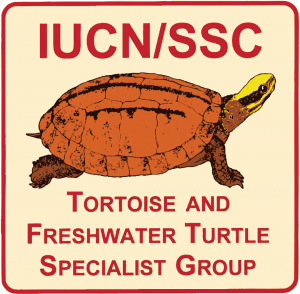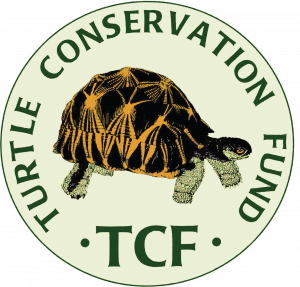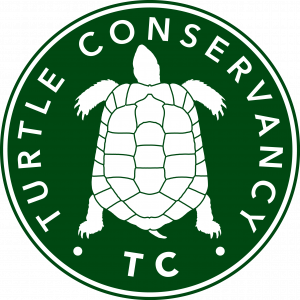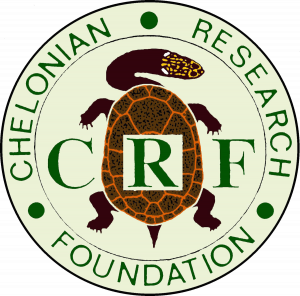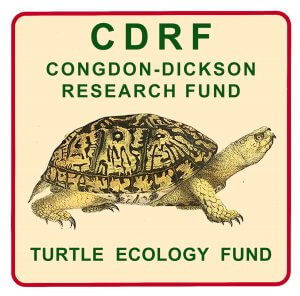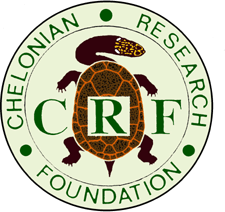Congdon-Dickson Research Fund
Justin Congdon and Nancy Dickson Research Fund
(Turtle Ecology Fund)
at Chelonian Research Foundation
Executive and Advisory Review Board:
Justin D. Congdon, Ph.D., Co-Chair ([email protected])
Anders G.J. Rhodin, M.D., Co-Chair ([email protected])
J. Whitfield Gibbons, Ph.D., William A. Hopkins, Ph.D., Roy D. Nagle, M.S., Vivian P. Páez, Ph.D.,
Njal Rollinson, Ph.D., Willem M. Roosenburg, Ph.D., Tracey D. Tuberville, Ph.D., Peter Paul van Dijk, Ph.D.
The Justin Congdon and Nancy Dickson Research Fund (CDRF) (Turtle Ecology Fund) at Chelonian Research Foundation (CRF), founded in 2020, awards small grants twice a year to individuals for ecological research projects dealing with freshwater turtles or tortoises, but not marine turtles.
CDRF primarily provides support for academically-oriented hypothesis-driven ecological field research on evolutionary ecology, life history, or physiological and/or behavioral ecology of freshwater turtles and tortoises, particularly projects involving environmental influences on individuals and populations. CDRF is especially interested in providing early support for pilot projects that may lead to long-term ecological studies of turtle or tortoise populations. Proposals requesting support for initiating or extending potential long-term studies should indicate the level of future protection of the study site, and clearly defined protocols and goals.
CDRF does not support projects on applied conservation or management, or conservation-oriented basic natural history studies. In addition, CDRF does not fund research primarily focused on veterinary science, toxicology, pathology, or wildlife disease.
Out of respect for our review committee members’ time, proposals focused primarily on these topics and/or turtle conservation or on turtle taxonomy or systematics issues will not be reviewed or considered by CDRF, but may be more suitable for submission to the Turtle Conservation Fund (TCF), the Mohamed bin Zayed Species Conservation Fund (MBZ), or the Turtle Taxonomy Fund (TTF). Please consider these other funds for such proposals.
CDRF also encourages its successful grantees to consider re-applying for extended support of the same project on an annual basis if their project would benefit from multi-year support. Proposals for such extended annual support (one year at a time per proposal) would require information on planning, execution, and potential success of the long-term research. Topics covered should include presence of study organisms that are abundant enough to yield empirically sufficient data, and also include long-term ownership and protection and security of the study site. Researchers should consider the level of cooperation and management of the property, and a mutual agreement should be discussed and confirmed by researchers and property owners. Without all of the above, the 32 consecutive years of research on the life-histories of three species of turtles on the University of Michigan’s E. S. George Reserve (ESGR) by Congdon and others would not have been a success.
Research support is primarily intended to: 1) provide faculty, post-docs, and supervised students with funding for ecological chelonian research, and 2) provide matching or seed funds for seeking additional sources of funding (e.g., the NSF Long Term Research in Environmental Biology [LTREB] Program, funding from private individuals, other NGOs, or state and local governments).
The maximum amount of each grant at this time has now (late 2025) been raised to US $10,000, but smaller grant requests of $3,000–5,000 or less are also encouraged to support pilot studies or other ecological research initiatives.
Who Can Apply
At least one of the applicants must be an academic researcher, typically a post-doc or professor at a university, or the equivalent in a non-university setting. Applicants from non-academic settings (e.g., citizen scientists or researchers with conservation organizations) should contact the CDRF Co-Chairs prior to submitting an application and provide additional information about the nature of their position and a clear concise statement of the proposed research topic so that their potential eligibility can be determined.
Proposals from faculty Principal Investigators (PIs) can include graduate or other students as co-PIs if it is well documented how the research will contribute toward graduate training and how the faculty PI plans to handle publishing research results within a reasonable time (with or without student involvement).
Applications will be considered from eligible individuals at either US-based or international universities and organizations, with funding decisions based on equitable treatment of applicants.
How to Apply
Application proposals must include a cover page followed by a detailed project description, providing summarized background of previous relevant work and objectives and justification for the planned work, including its relevance to conservation biology or management if pertinent, methodology, literature citations, and anticipated timeframe for the work, budget and justification, including funding requested or committed from other sources, and the CVs of the lead applicants.
There are two grant cycles annually,
with application deadlines of March 1 and September 1,
with funding determination by about April 30 and October 31.
Applications should be sent to
Anders G.J. Rhodin ([email protected]),
with copies to Justin D. Congdon ([email protected]).
- A standardized cover page (DOWNLOAD Cover Sheet HERE) must accompany each application and must include details about the project and the PI(s), the total planned project expenses, the amount requested from CDRF, grants requested or secured from other sources, the species being investigated, its IUCN Red List status, the geographic location of the project, and whether it is in a Protected Area.
- The project description should include the following headings: Executive Summary (less than 400 words, shorter is better), Introduction, Objectives and Hypotheses, Methods, Expected Significance, Budget and Timeline, and Literature Cited. Proposals may also briefly identify direct or indirect potential benefits the research can have on conservation-relevant concepts and problems. The budget and its justification need to explain how funds would be used and over what time period (citing start and end dates). Each section should be as concise and short as absolutely necessary to convey necessary information. The application proposal must include the Cover Sheet and should not exceed ca. 15 pages, excluding the Literature Cited.
- For the lead applicant(s), include a short C.V. (maximum of 5 pages), with educational and professional background, publications, funding, and any other relevant information. Information on the applicant’s current professional appointment should clearly demonstrate their eligibility for the award.
- For graduate student research, the PI advisor should provide a short CV that includes a statement of the status and progress of the student.
Review and Funding Process
All grants will be reviewed by the CDRF Co-Chairs, Justin D. Congdon, Ph.D. and Anders G.J. Rhodin, M.D., and the CDRF Review Board, currently consisting of the Co-Chairs and the following additional individuals: J. Whitfield Gibbons, Ph.D., William A. Hopkins, Ph.D., Roy D. Nagle, M.S., Vivian P. Páez, Ph.D., Njal Rollinson, Ph.D., Willem M. Roosenburg, Ph.D., Tracey D. Tuberville, Ph.D., and Peter Paul van Dijk, Ph.D.
CDRF prioritizes funding based on the reviewer-assessed validity, quality, and perceived benefits of the ecological research proposed, the methodological quality and probable feasibility of the proposed work, its potential contributions to graduate student training, and the apparent experience and qualification(s) of the investigator(s). It does not prioritize based on gender, ethnicity, or nationality of applicants, and such details are not required or requested.
CDRF provides grants in support of direct research and expenses of selected turtle projects and programs. CDRF does not provide support for indirect organizational overhead expenses associated with administration of grants, and will not fund requests for such indirect costs.
Grant funds are disbursed only after completion of a signed legal contract between CRF on behalf of CDRF and the responsible principal Grantee who will perform or supervise the proposed work, and funds will not be disbursed until any overdue or missing interim or final reports from previously supported projects are submitted and accepted.
Grantees are required to submit final reports after completion of the project and annual interim reports for those projects lasting longer than a year. All grantees are strongly encouraged to present their results at national and international scientific symposia and to publish appropriately as warranted in relevant scientific journals, notably Chelonian Conservation and Biology, the peer-reviewed scientific journal co-published by CRF and its partner Turtle Conservancy (www.chelonianjournals.org).
CDRF Funded Proposals
2021–2025
25 proposals funded to date
$95,985 granted to date
2025
3 proposals funded
$11,200 granted
Fokidis, H. Bobby. 2025. Ecological and health impacts of wildfire frequency on Marginated Tortoise (Testudo marginata) in Mount Hymettus, Athens. Rollins College, Winter Park, Florida, USA, and Dikemes – College Year in Athens, Athens, Greece.
Stone, Paul A. and Stone, Marie E.B. 2025. Survival and growth of hatchling Sonora Mud Turtles (Kinosternon sonoriense) in the Peloncillo Mountains, New Mexico. University of Central Oklahoma, Edmond, Oklahoma, USA.
Butterfield, Taggert. 2025. Home range, nesting, and paternity: investigating reproductive success in Sierra Box Turtles (Terrapene nelsoni klauberi) in SE Sonora, Mexico. Turtle Survival Alliance, North Charleston, South Carolina, USA, and Estudiantes Conservando la Naturaleza, Álamos, Sonora, Mexico.
2024
4 proposals funded
$17,410 granted
Wijewardena, Tharusha, Murray, Rosalind, and Riley, Julia. 2024. Investigating the cold-hardiness of Painted Turtles (Chrysemys picta) in an urban area with high climatic variability. University of Toronto Mississauga, Ontario, Canada.
Rollinson, Njal and Lloyd, Robin B., Jr. 2024. Rethinking temperature-dependent sex determination: a theory and an experiment. University of Toronto, Toronto, Ontario, Canada.
Carlson, Bradley E. and Kimble, Steven J.A. 2024. Using genomic data to understand behavioral diversity and population changes at a long-term study site for Eastern Box Turtles. Wabash College, Crawfordsville, Indiana, USA.
Moldowan, Patrick D. and Litzgus, Jacqueline. 2024. Quantifying population vital rates amid a second population catastrophe in a 50 year study of Snapping Turtle (Chelydra serpentina). Algonquin Wildlife Research Station, Whitney, Ontario, Canada, and Laurentian University, Sudbuty, Ontario, Canada.
2023
3 proposals funded
$9,000 granted
Lehnen, Charles. 2023. Tortoise terraforming: will the introduction of Española Galapagos Giant Tortoises restore Santa Fé Island’s ecosystem? University of Southern California, Los Angeles, California, USA.
Guiry, Eric and Kennedy, J. Ryan. 2023. Building millennial-scale records of turtle ecology in the Chesapeake Bay watershed. Trent University, Peterborough, Ontario, Canada, University of Leicester, United Kingdom, and Indiana University Bloomington, Indiana, USA
Roe, John H. 2023. An individual-based ecological study of a critical life-stage transition in Eastern Box Turtles (Terrapene carolina) in response to prescribed fire management. University of North Carolina, Pembroke, North Carolina, USA.
2022
6 proposals funded
$22,375 granted
Hollender, Ethan and Willson, John D. 2022. Impacts of Alligator presence on the movement patterns and habitat use of Western Chicken Turtles (Deirochelys reticularia miaria). University of Arkansas, Fayetteville, Arkansas, USA.
Karraker, Nancy E. 2022. Quantifying fine-scale habitat use and movements of Wood Turtles (Glyptemys insculpta). University of Rhode Island, Kingston, Rhode Island, USA.
Duran, Jonathan and Barrow, Lisa N. 2022. Investigating feeding ecology in freshwater turtles using parasites and stable isotopes. University of New Mexico, Albuquerque, New Mexico, USA.
Tuberville, Tracey D. and Rimple, Ryan. 2022. Reproductive ecology of eastern box turtles in the Coastal Plain of South Carolina. University of Georgia Savannah River Ecology Laboratory, Aiken, South Carolina, USA.
Bulté, Gregory, Lougheed, Stephen C., and Cairns, Nick A. 2022. Overwintering ecology of the common musk turtle at the northern edge of its range: a pilot study. Carleton University, Ontario, Canada.
Topping, Nicholas and Valenzuela, Nicole. 2022. Thermal response of circulating estrogens in an emydid turtle, Chrysemys picta, and the challenges of climate change. Iowa State University, Iowa, USA.
2021
9 proposals funded
$36,000 granted
Luther, David A., VanDoren, J. Hunter, Akre, Tom S.B., and Connette, Grant M. 2021. Survival of juvenile Wood Turtles (Glyptemys insculpta) in two distinct landscapes in Virginia. George Mason University, Fairfax, Virginia, USA.
Coleman, Andrew. 2021. Tracking aquatic habitat use of Eastern Chicken Turtles (Deirochelys reticularia reticularia) in southern Alabama. Talladega College, Talladega, Alabama, USA.
Ghaffari, Hanyeh and Safaei-Mahroo, Barbod. 2021. Habitat use and nesting ecology of Euphrates Softshell Turtle Rafetus euphraticus in Haur-al-Azim Marshland. University of Kurdistan, Sanandaj, Iran.
Petrozzi, Fabio, Luiselli, Luca M., Gonedele Bi, Sery, and Fa, John E. 2021. Can “synecology” affect conservation perspectives? A study on trophic resource use by sympatric vs. allopatric Pelomedusid turtles in West Africa. Applied Ecology Studies and Solutions, Rome, Italy.
Páez, Vivian P. and Bock, Brian C. 2021. Size at maturity, reproductive phenology and temperature dependent sex determination on the Savanna Side-necked Turtle, Podocnemis vogli, Vichada department, Colombia. Universidad de Antioquia, Medellín, Colombia.
Ducotterd, Charlotte and Luu, Vinh Quang. 2021. Diet assessment of the Indochinese box turtle (Cuora galbinifrons, Bourret 1939) in Northern Vietnam, using a newly developed DNA metabarcoding approach. Turtle Sanctuary, Paris, France.
Carroll, Brooke and Litzgus, Jacqueline. 2021. Social behaviour of Painted Turtles (Chrysemys picta) from a long-term study. Laurentian University, Sudbury, Ontario, Canada.
Maerz, John C. and Bradke, Danielle R. 2021. Drivers of the spatial ecology of Diamondback Terrapins in Georgia. University of Georgia, Athens, Georgia, USA.
Rollinson, Njal, Mahler, D. Luke, and Ravenhearst, Danté. 2021. Exploring the function of turtle barbels using TEM technology and a phylogenetic comparative approach. University of Toronto, Canada.
